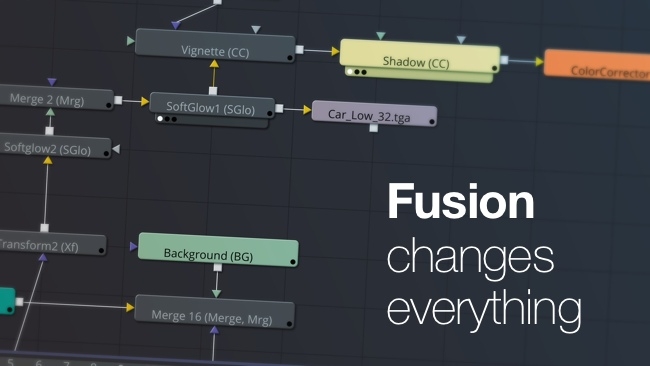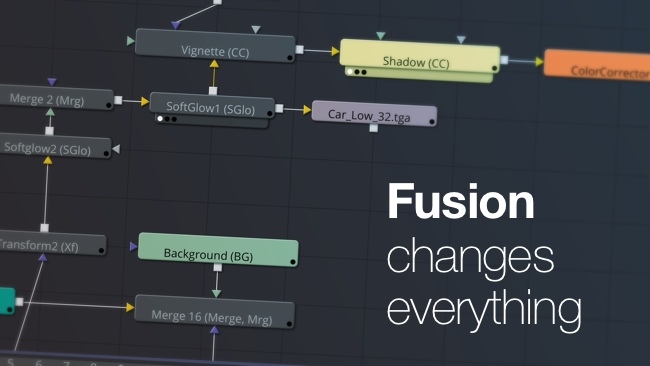
 Fusion Node-based editing
Fusion Node-based editing
Blackmagic's acquisition of Fusion is big news. It's going to make waves in the post production industry. It's changing things forever.
Blackmagic's acquisition of Eyon Fusion could be the biggest thing to happen in post production for a decade. It's a very clever business move that changes the map completely, and will disrupt the industry for years to come. For users, it's a dream: software that was previously a major budget item, or simply unaffordable, is now either free or within reach - especially because the paid-for version mostly differs by having features that will appeal to companies rather than freelancers.
The revolutionary nature of the new cost structure can't be overemphasised. This type of software has never been cheap. That's not surprising: it's complicated, with a steep learning curve. You don't write a 3D compositing package overnight. You probably don't even write it in a decade. When Blackmagic started selling products, they were relatively simple. A capture card either works or it doesn't. A converter either converts or it doesn't. Of course there's more to it than that: construction quality, reliability and usability all matter. Subtleties that you wouldn't normally think about like jitter matter as well. So while the products might have been simple on the surface, they weren't easy to make without good engineers and good designers. But they were simple compared to the type of product that Blackmagic also sells now.
There are, as I see it, two main reasons why Fusion matters so much. First, it's a very serious product. It's as deep as it is wide, and it's very wide indeed. What does this mean? It has a lot of very powerful, useful features. If it were merely a compositor, then it would be a fantastic tool, but it goes a very long way beyond that. If you want to know how deep Blackmagic Fusion is, just visit Blackmagic's website and read about it. When I did that, it took me twenty minutes. That's an extraordinary amount of space to devote to a single product that is one of so many, and surely an indication of how important Fusion is to the its new owner.
Second, it's going to pay a critical role in almost every feature film's post production. It's a missing link. Compositing is an "invisible" process. The less you see it, the better it is. Fusion (we know this from its history) is so good that you never see it. That's the whole point. While Fusion goes way beyond compositing, if it didn't do that well, it wouldn't be a valid product.
It's fairly easy to explain keying and the various types of compositing. But it's not easy to create a product that actually does it well. There are simple algorithms that will do it in a basic way, but to do it with real world material, which is always less than ideal, then you need the experience of developers who have been solving hard problems for decades.
What will Fusion mean for freelancers?
Now lets look at what Fusion will mean for the vast swathe of freelancers and small production companies that will now be able to afford to use it. What's really interesting here is that a significant number of these will be using Blackmagic cameras and Resolve, Blackmagic's other high-end post production tool that will take care of DIT, grading and, increasingly, editing.
Put all these together and it means that for possibly as little as the purchase of a Blackmagic Pocket Cinema camera it will be possible to make a feature film end to end, including green screen and top-end visual effects.
You might think that few freelancers can do what the big production companies do, which is to use green screens and 3D models as a way not only to enhance their shots but to save money as well. (It saves them having to build whole street scenes for example). But you only have to trawl though YouTube or Vimeo to see that small, independent, aspiring film makers are perfectly at ease with creating complex 3D environments and models. But have so far lacked the best tools to integrate them into their productions.
Remarkably, for very little money indeed, freelancers and small companies now have access to cameras that can shoot raw video at 4K resolution, industry-standard grading and (evolving) editing ability, and now, with Fusion, the capability to weave all the elements together. The entire film industry will be affected by this. It's not that everyone else might as well give up - if that were the case, then Avid would have shut down when Final Cut Pro came out - but they will have to pay attention. They might have to change their business models. They will have to pamper their existing users. Or they might simply have to "out-innovate" their competitors.
It will be uncomfortable for them. Meanwhile we can expect to see ever increasing numbers of small films with big post production values. We think this will be good. And with Fusion being as deep and as complicated as it is, we think that users with real talent will have a chance to flourish.
Read Blackmagic's purchase of Eyeon Fusion will send shockwaves through the post production industry
Tags: Post & VFX


Comments